The current state of streetwear puts value on exclusivity above all else. Copping the latest Virgil-designed Nikes, grabbing that limited Yeezy colorway, that new Supreme collaboration — it’s all designed to separate the haves from the have nots. Maybe there was an era when that was actually cool and represented having your ear to the ground, but in 2021 the “haves” are often nothing more the people who have the means to pay for bots to game the systems and new products are bought not be worn, but to be instantly flipped for a profit at grossly inflated price.s Streetwear has gone from being fashion for the people to pricing out its intended audience.
Los Angeles-based streetwear brand, Kids of Immigrants is fighting to change that. To do so, they’re shining a spotlight on what’s truly important — community.
“I wish brands would lead with love,” says KOI co-founder Weleh Dennis. “If most companies can start off at that point, we’d be good. People get caught up in the wrong things. Say your company comes up with a product breakthrough. How do you not make that as exclusive as possible but make it as inclusive or accessible as possible?”
That emphasis on inclusivity is something that has been a part of the Kids of Immigrants ethos since before its official launch in 2016, back when co-founders Daniel Buezo and Weleh Dennis first conceived the brand. Since that time, the company has steadily grown its fan base, even catching the eyes of music’s biggest style icons — including Dua Lipa, Lil Uzi Vert, Jhene Aiko, and Bad Bunny. But even with buzz, KOI makes sure their drops continue to speak to the communities that set them up for success.
As summer streetwear season heads toward the first fall drops, we linked up with Weleh and Daniel to talk about the brand’s community-driven approach to streetwear, how other brands can do better, and where they see the brand headed in the future.
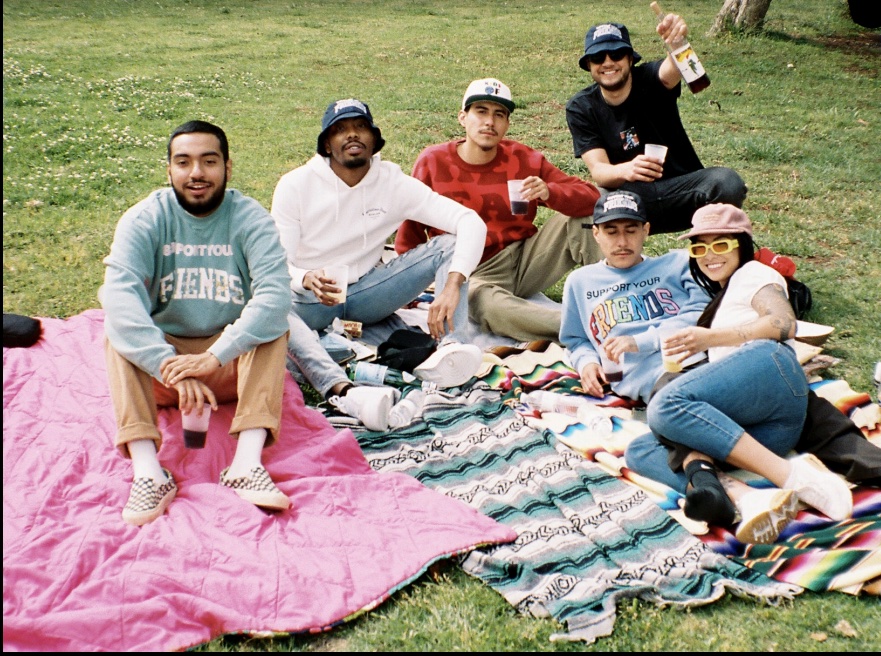
Ya’ll are an LA-based brand and collective and most recently you teamed up with Vans, a brand that is distinctively SoCal as well. This is your second collaboration, why build up this history with Vans?
Daniel: I think what’s cool about the Vans partnership is that I remember six years ago, talking to Weleh, and him saying Vans is sort of an ideal brand, not even just to collaborate with but just as a brand that we would like to look at for standards, and them being a skate brand and sticking to the skate culture and being a California brand. Also, Weleh worked at a Vans retail store back in his college days. So it was a full-circle moment when we were able to collaborate with Vans just because that was a brand that he would talk about as being sort of admirable in terms of who they are and what they do.
When we had the chance to collaborate with them it was pretty easy for us to say “yes,” because it was something that internally we looked up to.
Weleh: Working there was a big part of it, going from selling it to being a part of the process of putting something out was super awesome. The culture itself is very reminiscent of Kids of Immigrants, in terms of the positivity, the connection to creativity. Skate culture as a whole was just something that was really cool to align with.
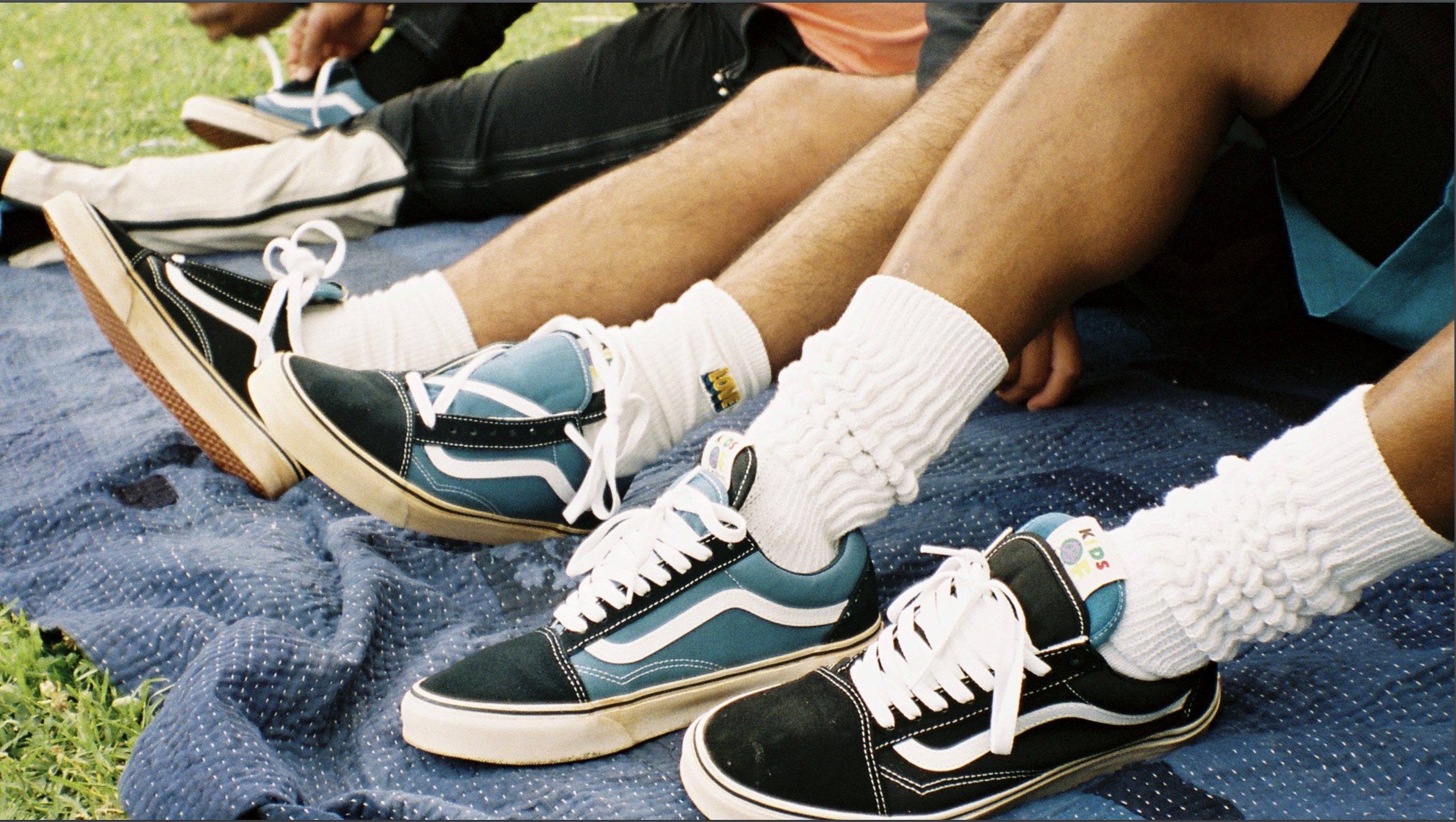
Glad to see you guys are going strong. The pandemic gave brands a chance to pivot their ethos, how did the last year shape Kids of Immigrants?
Daniel: I think it just encouraged us even more to continue doing what we’re doing. Between the pandemic and everything that happened in terms of the social climate of things, we felt that we were on the right path. I feel like the shifts that were taking place with a lot of different people, companies, and society in general was very much in line with the things we’ve been representing, and striving to expand on, whether it’s the community work, or what we believe is activism in our own way, through representation, creativity, through working with our community and serving small businesses.
The pandemic brought a business concern to everything, but for us it made us hone in on why we’re doing this beyond the business side of things. Wherever we’re at now with this pandemic, we’re grateful to be here knowing this wasn’t our intention, to begin with. We’re really just getting started, and I think there was a strong shift that’s irreversible on how people want to shop and how people want to support — whether it’s people of color, black businesses, whatever. It’s in line with what we’ve been doing for the past five years.
Recently, you guys teamed up with Youth To The People for a skincare and apparel launch. It was a collaboration that celebrated self-care and self-love. Why did you feel that was an important message to get across?
Weleh: We always talk about healing, just in general, past experiences, it doesn’t have to necessarily be traumas, just reflecting on moments in our lives, and a lot of reflection deals with diving deeper into self, which is something me and Danny always talk about so it was a great opportunity to have something manifest from discussions and conversations that we have on a daily basis into an actual collaboration with the company that has the same outlooks in terms of what they’re trying to give to the people.
Danny: I think even going back one question with the pandemic, self-care was really important. It was the first time we were forced to be home and take inventory of our lives and one of the things that we came out of the pandemic being the most aware of was our health, our mental health, and our emotional and spiritual health. We’ve been about working with our community since the beginning and I think that it was important for us to realize that in order to pour onto others, in order to show up for our community, we have to take care of ourselves first.
I think in this day and age where the youth and so many people are involved in trying to make this world a better place in their own unique way, I think its important that in these times as we become active in wherever we feel our heart to be active, its important to take care of ourselves while we’re on the duty of doing the work. It was an important moment where we stepped back as individuals.
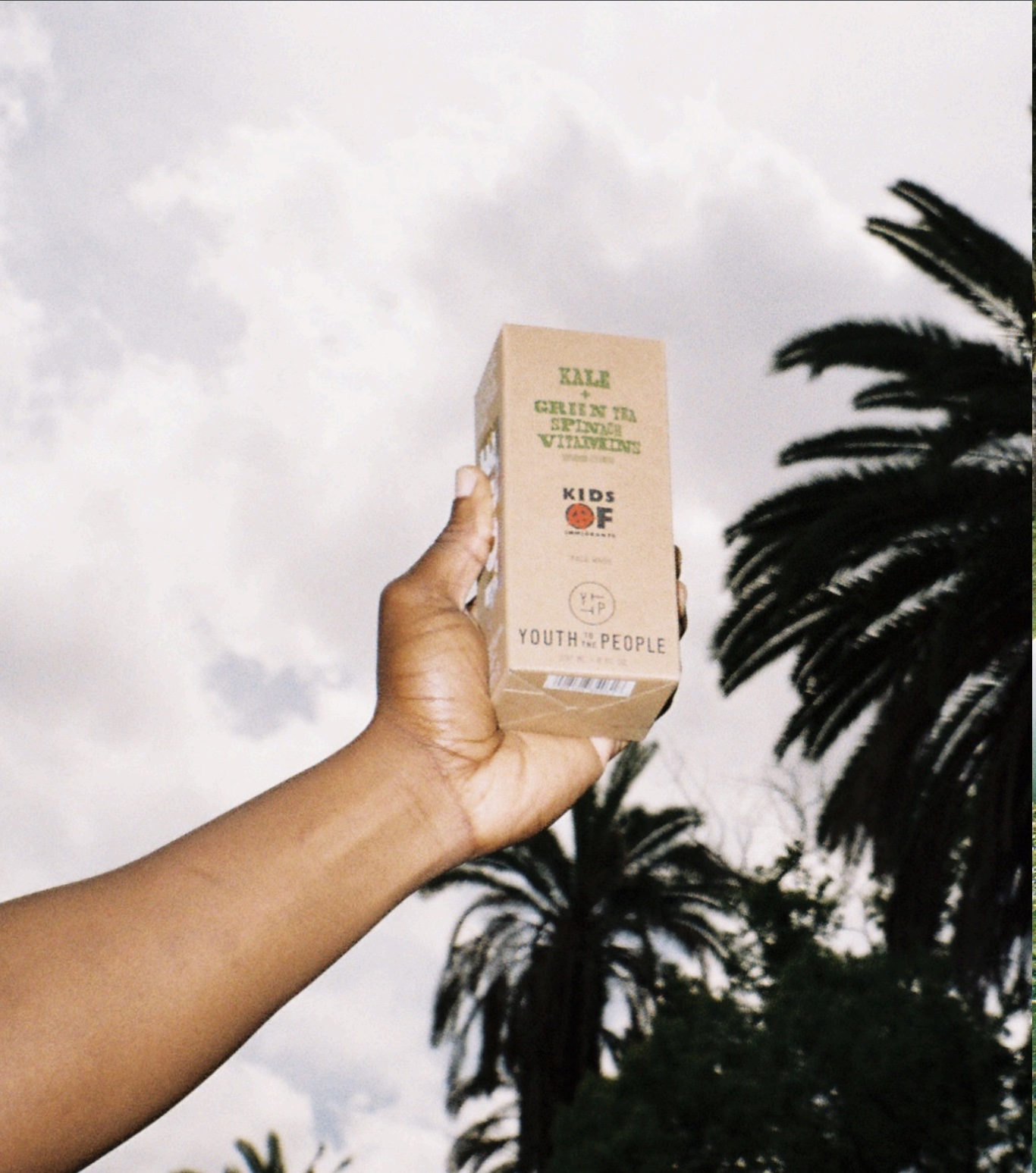
Each Kids of Immigrants drop features some kind of charity or community component, whether you’re partnering with a nonprofit or raising funds, why have you made that such an important aspect of each launch?
Daniel: It’s not every single drop, but when we started the company we decided community and the product are equally important. It’s product with purpose, it may not be every single drop, but as far as the charity aspect of it, it’s not always about donating money, but, how are we showing up? How do we show up in these different communities, how are we showing up for our people even if it’s just shooting a Lookbook? So working with that intention is definitely always in our minds.
I remember our first year we donated $5000 to inner-city arts for a 3D printer and we didn’t even have $5000 in our bank accounts, but we did it because there is no Kids of Immigrants without the community, there is no purpose or drive to what we do without the people we do it for. For us it’s our own social responsibility of how we want to move in the business world. More than just a supply-demand, profit loss.
All that stuff is important but for us, there is no significance to that if we don’t do it for what we set out to do.
Weleh: To second that, we started Kids of Immigrants to lead by example. I know “Community” when it comes to these things is… interesting, especially when talking about clothes, but that’s the main intent. At some point, I felt like it wasn’t something that was being talked about so it’s dope for you to bring up how community is part of our company, and how that was from the jump part of our ethos. Everything we’re doing is not to just give fish to people, but to teach people how to fish. When we do collaborate with people, whether it’s a charity or something with Vans, it’s all to just show people what they can do and how they can do it too, how they can lead with love and positivity because before it wasn’t really a thing that we felt was out there.
To go back to the whole diving into self thing, all of those are just examples, as opposed to just telling people that we can do it, we want to really just show them, and show them that collaborating with a nonprofit is a cool thing, not just a “we’re giving back,” we’re partnering with these people, really understanding them, and hopefully inspiring them to go out and do it themselves.
Where did that interest stem from? Did you guys grow up with a community organizing background, or did you see a hole in what other brands were doing?
Daniel: My educational background is in social work and furthermore, we were those kids. We grew up feeling underrepresented, feeling like we don’t have a voice, all those things that we talk about and empower now are things we once felt. I use the 16-year-old version of me as my rule of thumb, what did he need at that age, I wasn’t a bad kid or anything like that, but I was in trouble all the time. I didn’t have the role models that could’ve helped in my youth. I always say “we don’t do better cause we don’t know better,” and we wanted to represent that and be the leaders that we were waiting for.
Some fans of the brand include Dua Lipa and Bad Bunny. Which star’s decision to rock the brand left you feeling the most starstruck?
Daniel: For me, it’s always the people — I mean I’m not going to lie, probably Bad Bunny is my favorite musician, but it’s always exciting when we see the everyday person wearing it. That’s who we made it for. Seeing artists and celebrities wear it is cool, but we made it to equal the playing field. We don’t want it to be about hype, we didn’t make it to be about “Hey I got this, you ain’t got these or this shit, you can’t rock this.” We’ve both been in fashion for 10 years and we understand the exclusivity, and the special limited shit that to me felt like it can really drive up your ego at times, and we’re part of that culture as well, but we never wanted that.
We didn’t want to make clothes to be exclusive. I saw somebody wearing it the other day, they didn’t know who I was, I said “Hey nice shirt,” and they looked at me weirdly like “who is this person?” I thought that was amazing. This person is wearing KOI, they don’t know who I am, and they’re just owning it on their own because it represents something within them.
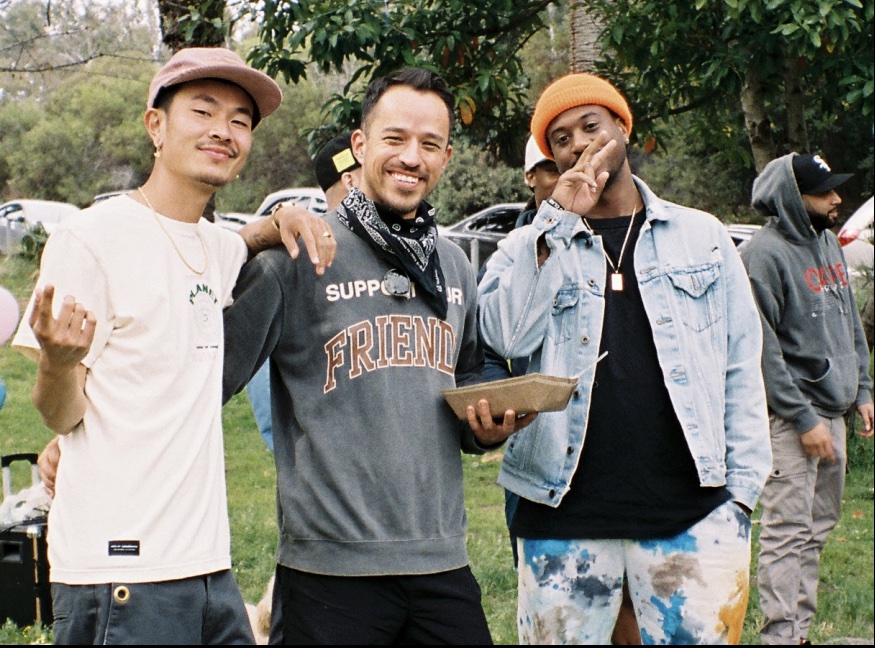
Weleh: I guess from my end the biggest thing is — it’s not really a person, but having more of a fashion background and wanting to create things for my mom, or my cousin or my friends, when your doing clothing something they ask you is “what’s your demographic” and of course there is a demographic, but overall we’re all human in my mind so I think seeing the hottest new artist, whether its Playboi Carti or Big Sean wearing it, but then we also have a teacher and a mother in San Diego wearing it at the same time, same drop, both feel fly and both feel energized.
For me personally, that levels out anything any artist can wear. Our biggest thing is trying to connect people together, it’s not only about selling something. Everyone at some point in their lineage is a kid of an immigrant, so its more of an acknowledgment, but I think its cooler to feel like the bridge between generations and cultures, or ethnicities, that more than anything inspires me to want to do what I’m doing.
Continuing to inspire communities and find the connections throughout independent personal perspectives. I encourage people to be individuals, but that’s only because when you can take confidence in that individuality you realize it’s an experience that is similar, and so you give people the ability to become teachers through their experiences, and that to me is super empowering.
In the brand’s current iteration, how would you describe it to someone who has never heard of KOI, or is it still “product with a purpose?”
Daniel: I think as the brand just continues to evolve, and the principal and morality of the brand is still there, it’s evolving into something more than just a product. Whether it’s the experience or being able to do skincare or a Vans shoe, we want to put the paint where it ain’t. We want to show this community that we can move in all these different spaces. If you think about what inspires these kids — if you see somebody that walks like you and talks like you and you have any type of connection with them because of who they are or how they look, or their color of skin, whatever that might be, if we show that we can do a skincare brand, that we can do these events and collaborations with these corporations, that can be super empowering and it can transcend in more ways than we can ever imagine.
Right now it’s the same company morals, but we’re asking “how do we continue to evolve in these brand new spaces where maybe this sort of representation didn’t exist?”
Speaking of moving into those different spaces, what’s the craziest thing you want the brand to do?
Daniel: I would say move beyond products. One of the things we’ve been working on is creating our own holiday. We feel like we have this business model of putting community first and that can evolve into so many different types of businesses. The way we see it is we’ve been doing this for five years, how do we give somebody, the next person, the future, these positions we’re in as we continue to evolve?
I don’t want to continue to just focus on collections and things like that, I’d love to see the next generation do it, we laid the foundation so I just see us evolving into… I don’t know, I see us evolving to what be the next LVMH, or what Kanye did with DONDA, so many people came out of Kanye’s group, from Virgil to Don C to Heron Preston to Matthew Williams, now they all have their own shit going on. I see that type of evolution that is beyond what these collections are. I see us moving in spaces, there is right now an opportunity that is happening from sports to festivals, to being part of school programming and education. It’s really endless!
I really see infinite possibilities, we’re stepping up to do what we’ve set out to do.
As someone who covers style for a living, I appreciate that your Instagram feels real. I see ya’ll working, it doesn’t seem like a normal fashion brand. Was that important to put across as a brand when dealing with social media, or is that just a product of who you guys are?
Daniel: We wanted to just be real and be transparent with it. If it’s perfect it ain’t real, if it’s real it ain’t perfect. We wanted to show that we are just like you, we understand where we’re at because of our position, but it’s only exciting for us if you can understand that you can do it too in your own way. We are a family and we want to show that. At times I write about how our shit is delayed, we want to tell our audience and community “yo we’re here with ya’ll,” we’re not better, we want to be leaders among other leaders, by showing that transparency we can truly empower people.
When we talk to our community and they talk to us about us that’s always those moments when you really appreciate it. Wow this person is telling me about my life and they don’t even know me, they’ve seen it through Instagram and followed the journey and are empowered by being part of that journey. Even if it’s just watching the quality change over time. They appreciate the cheaper shirt from years ago because they’re excited to be part of it in whichever way.
Weleh: From day one, our whole thing was to be able to communicate with the language of our culture. I think that’s what keeps us a little more authentic in terms of the way that we translate to whoever it is we’re talking to or collaborating with. Things get dressed up a lot but that’s not because that’s real, but that’s more a tradition of what you consider “good presentation.” I learned that cutting through is not being worried about the way you say a word or the way you conduct and style yourself on a daily basis, so long as you’re leading with love in that direction.
I remember in the early days when Danny would post something and there would be a typo that would drive people crazy, but now I don’t think people would dare to point out a typo if the message is affecting them in the way we are meaning to. We just want to continue to connect with the way that our language has been and the way our culture speaks by talking about the subjects that our culture is interested in. I don’t mean we’re doing a census of a certain demographic, but we continually, before every new collection, have a conversation about life, and since we’re human there are always going to be some connecting factors that go on through that design process so as long as we can be as real as possible. The ones that are really supporting us are the ones that are in it with us, and going through these things. That’s why a collection like “Support Your Friends,” or “Anything Is Possible,” Or “Love,” all those things mean a lot more because in those times of pain, it’s something you can wear as a badge of honor.
When we first started, one quote me and Danny would always write down was “this pain will be useful someday.” Your experiences are what you are and who you are, you shouldn’t be ashamed of them. Once you connect with them and communicate them to the next person, that’s a way in which you can build a network or this community that everyone is beginning to notice.
It’s always been there but there hasn’t been any type of conversation or something simple like a shirt that says “Support Your Friends” that someone can say “I really like what that says.” That starts a conversation and through that, hopefully, someone can make a new friend or they can connect back with the brand and connect with us.
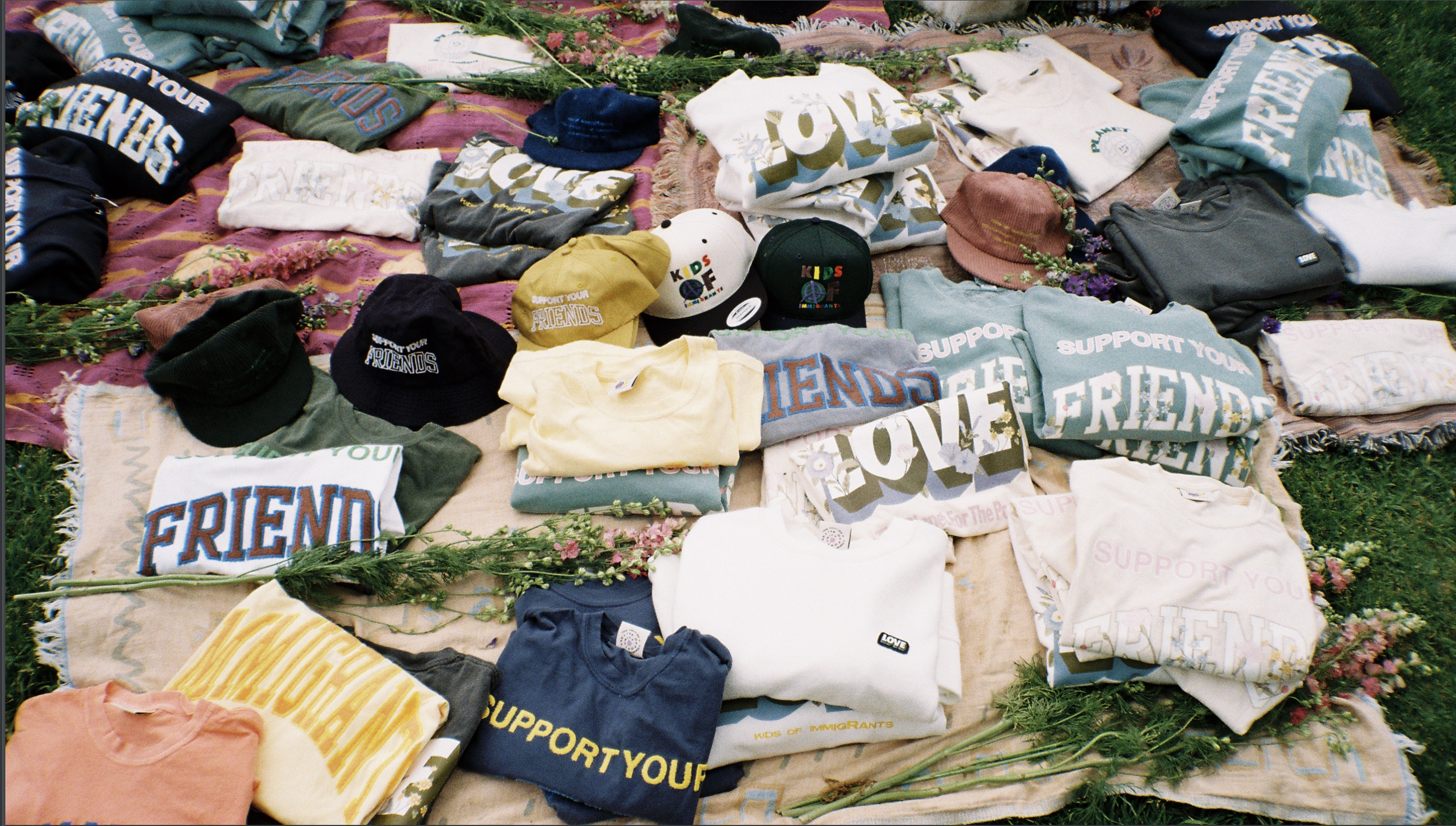
What can the fashion industry, as a whole, do better?
Daniel: I don’t know what anyone can do better, only they know. I feel like we’re just going to continue doing what we’re doing. I can just hope that we continue to inspire, because whether we’re inspiring people directly or indirectly, I know we’re part of a better change of the fashion industry.
Obviously, sustainability is really important, so that’s something we’re looking into and the rest of the industry is looking into more, but I think a brand needs to be more than just a pleasing aesthetic and design. It needs to represent something more than that. The brands that evolve will continue, and those that don’t, I don’t see where they’re going to be in the future. I also feel like the sense of competition and the sense of being better than the next brand doesn’t represent community.
When bigger brands talk to us and they want to tie you into being exclusive to them, I think that’s an old way of thinking. The youth is showing that, they’re showing up for new ways of thinking. We just want to continue doing what we’re doing and get better at it. For us even with the growing and expanding of the brand, it’s not just business, but asking the question, “how do we become more impactful?”
The business will come from that, we aren’t in meetings talking about profit margins all day and I think when I talk to a company sometimes the answers are right in front of us but we are so overly concerned about what the social climate is, and what the next person is, and how can we be better, instead of just doing what you do best. There needs to be a balance between what your purpose is and what your business is.

